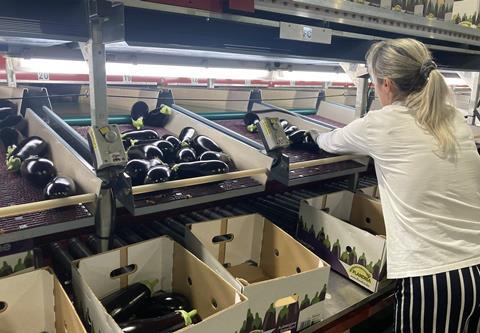Reduced border checks would be welcomed by Belgian exporters during an important period for tomatoes, peppers and aubergines

The “landmark” deal struck between the UK and EU this week will ease the red tape for agricultural producers, according to the UK government, and result in cheaper food for consumers.
While the impact on UK border check facilities and non-EU exporters remains uncertain, reduced border checks on animal and plant shipments to and from the EU, thanks to a new sanitary and phytosanitary (SPS) agreement, have been welcomed by vegetable producers across the Channel.
“This is a crucial period for Belgian tomatoes, peppers and aubergines,” said Veerle Van Der Sypt, secretary general of exporters’ association Fresh Trade Belgium, and “the outcome of the UK-EU summit makes us hopeful with a perspective to continued trade without the complications of phytosanitary certifications. The intentions are there, that’s a start. Now we wonder when and how this will be put into legislation.”
The new agreement reportedly removes the need for time-consuming and costly checks and forms, but means the UK will have to align with EU food standards. And with new border checks originally expected to be introduced on 1 July 2025, confirmation on particular elements is eagerly awaited.
“It’s dangerous if we only rely on good intentions,” said Van Der Sypt, “but on the other hand it would be absurd to introduce a measure on 1 July knowing that some months later it will be abolished. We hope the UK government finds a practical legal solution and we are looking out for confirmation.”
The new agreement appears to be good news for the Belgian potato sector, with companies again able to import Scottish seed potatoes. “For some years now we were urging national authorities and the Commission to get EU access to Scottish seeds and now it seems a solution is coming within reach,” said Van Der Sypt.
For some fresh fruits and vegetables, however, there remain issues to be resolved, including for products like citrus and mangoes.
“The EU has very strict phytosanitary import requirements, including for citrus black spot, while the UK eliminated all requirements when leaving the EU,” said Van Der Sypt. “We’ll have to cover the risk of, for example, citrus from South Africa entering the EU market via the UK. The fact that the UK is an island may help.”
Daniel Soares, international director at French interprofessional organisation Interfel, said he believed “the impact will be positive, as control and administration procedures will disappear in both directions”.
The UK’s National Farmers Union (NFU) broadly welcomed the deal since it provides easier and quicker access to the big EU market for UK producers.



